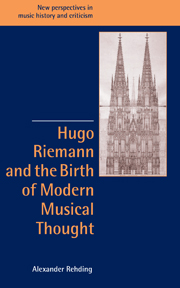Book contents
- Frontmatter
- Contents
- Acknowledgements
- Introduction
- 1 Hugo Riemann's moonshine experiment
- 2 The responsibilities of nineteenth-century music theory
- 3 Riemann's musical logic and the ‘As if’
- 4 Musical syntax, nationhood and universality
- 5 Beethoven's deafness, exotic harmonies and tone imaginations
- Epilogue
- Glossary: Riemann's key terms as explained in the Musik-Lexikon (5th edn, 1900)
- Bibliography
- Index
4 - Musical syntax, nationhood and universality
Published online by Cambridge University Press: 22 September 2009
- Frontmatter
- Contents
- Acknowledgements
- Introduction
- 1 Hugo Riemann's moonshine experiment
- 2 The responsibilities of nineteenth-century music theory
- 3 Riemann's musical logic and the ‘As if’
- 4 Musical syntax, nationhood and universality
- 5 Beethoven's deafness, exotic harmonies and tone imaginations
- Epilogue
- Glossary: Riemann's key terms as explained in the Musik-Lexikon (5th edn, 1900)
- Bibliography
- Index
Summary
Besides the metaphor of musical logic, as discussed in the previous chapter, the metaphor of a syntax of music was prominently employed by Riemann to describe his idea of how music works. Again, its precise meaning and the interrelation between the two metaphors are anything but clear. It is noticeable that Riemann's early works are oriented by various aspects of language: after his dissertation, Musikalische Logik, he embarked on two projects entitled Musikalische Syntaxis (1877) and Musikalische Grammatik, though the latter manuscript remained unpublished and was destroyed when he could not find a publisher. In some ways, the early works would have appeared like a kind of ‘musicological trivium’, in which linguistic aspects of music are determined. The relation between logic and syntax is addressed in Musikalische Syntaxis:
If one insists on drawing analogies, one could roughly compare the … simple [cadential] thesis with the sentence of the simple judgement in language. The subject would be the tonic and the predicate the confirmation through Quint-klänge, Terzklänge, etc.
The relationship between language and logic that Riemann presents here is marked by a certain uneasiness: although he seems to be talking about language, the ‘simple judgement’ that he mentioned would suggest that he is primarily thinking about logic. Under this ambivalent notion it becomes impossible to tell whether the ‘subject’ and ‘predicate’ which he defined in the sentence that follows are supposed to be logical or linguistic terms – or rather, Riemann appeared to underline that he considered the two to be indistinguishable.
- Type
- Chapter
- Information
- Hugo Riemann and the Birth of Modern Musical Thought , pp. 113 - 161Publisher: Cambridge University PressPrint publication year: 2003



